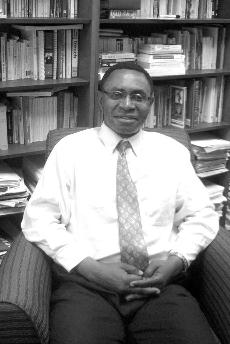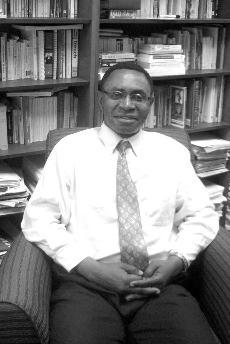
(Nhi Nguyen)
Young: Tell me about your background. Where you are from, where you went to school, and how you came to teach at Lawrence.
Vetinde: I’m originally from Cameroon. I grew up in Limbe, which is about 45 minutes by car from Douala, the economic capital of Cameroon. I went to the University of Yaoundé in Cameroon and I did additional undergraduate work in France at the Faculty of Letters and Social Sciences. I also did some of my graduate work in Cameroon at what we call the Ecole Normale Supérieure, it’s the highest teacher’s college. It is from there that I left to the U.S., and did my graduate work at the University of Oregon, I got a master’s and a Ph.D. there. From there I had two years teaching at the University of Kansas, and then from there moved up here [to Appleton] in 1996. My Ph.D. is in romance languages with a specialization in Francophone-African literature.
Young: Why do you think it’s important in this day and age for students to study a foreign language? Do you think bilingual ability has significance in today’s world?
Vetinde: Absolutely! Of course, I believe in bilingualism and I believe it is important for students in a liberal arts institution such as this to come out bilingual. It really paves the way for them to operate as cosmopolitan citizens. I’m currently reading a book about cosmopolitanism, and the whole idea is to become a citizen of the world. How do you do that? You only become a citizen of the world if you are bilingual. I try to steer students away from what I would call “monolingual narcissism,” that is, students who don’t want to learn another language with the dominance of English. I think when you learn a language, you learn about people. Language is not simply learning about the conjugation of the verbs and tenses and other [aspects]. You learn about culture; that is the way to operate in the world. If you don’t know about people and you don’t know about other cultures, you don’t have any respect for them and you can’t understand them. So interaction is not possible without cultural literacy. Linguistic and cultural literacy is gained through the learning of language! So, yes, I think it’s important for students to process through that way and become citizens of the world, and know the responsibilities that we as human beings on this planet have toward each other.
Young: Did you grow up bilingual yourself?
Vetinde: I really grew up polyglot, actually, more than bilingual because I spoke French, English, my native language [which is] a form of Creole we speak in Cameroon called pidgin, and two or three other languages. I still know them; though I don’t get a lot of opportunity to practice, but the way I keep one of them alive is by listening to music. I am just a music lover so I listen and keep the language alive, too.
Young: Do you think we can learn a lot about the culture of a people by studying their language?
Vetinde: Let me take the example of the French department. We have classes that will provide a window for the students to learn about the history, culture and traditions of the people from which the text is taken. This term I’m teaching Intro to Francophone African literature, and one of the texts we cover is called “God’s Bits of Wood” by Sembene Ousmane. That text contains a lot of culture, African history, the struggle for independence, and all of that, so, through studying the text, we learn a lot about the culture and people.
Young: What do you feel is the most challenging aspect of learning another language?
Vetinde: There are many challenges. The most challenging aspect is the pronunciation. [When] learning a language, you can study and learn the vocabulary, the syntax, and the semantics, all of that, but speaking it is a challenge, and that is why in all the foreign language departments here, we lay a lot of emphasis on speaking, because that is crucial. That is the most challenging thing to me because students tend to be shy; they think, “Oh, if I say this, am I going to make a mistake about this?” I think once you get over that hump of being scared to speak the language, it becomes really easy. Study abroad, I think, is fundamental [as well], not just for language learners but for everybody. Studying abroad provides opportunities for meeting other people, and that way students can compare their own societies with their host societies abroad. We always encourage students in the French department to go to France, Senegal, or Quebec, because as a language learner, it is crucial for that immersion. There are a lot of people who are very literate in a language who cannot speak it because of that fear [of making a mistake], so study abroad provides [that] cultural immersion.
Young: What are your hobbies? Do you have a favorite book, or band?
Vetinde: That is a difficult question for a literary person like myself who reads a lot of books. One of my favorites is a book called “The Stranger” by Albert Camus. He’s a French writer who grew up in French colonized Algeria. You had a group of French people who really felt like they were part of Algeria, and Camus was one of those. I like “The Stranger” because of the philosophical and existentialist basis of the book. I also like “Voltaire” by Candide. I really enjoyed reading “Cruel City” by a Cameroonian writer called Mongo Beti, and then of course, Sembene Ousmane’s “God’s Bits of Wood. ” I also read in English. I really enjoy reading Shakespeare’s tragedies, such as Hamlet. I think Shakespeare is my favorite English writer. And then of course, amongst the African literature written in English, my favorite work there is Chinua Achebe’s “Things Fall Apart.” And music! How do I say this? I love almost all kinds of music. I like classical music. I also like Cameroonian music, which is called Makossa. It’s very rhythmic, and I will tell you this and you will be surprised sincemy students are always surprised. I like country music. This was part of the American influence all around the world. When I was growing up we used to listen to the music of Hank Williams, Don Williams, Dolly Parton, and so I really love that music, because it reminds me of growing up, and because of the stories. The narratives are so interesting, when you listen to what they’re saying. I listen to some rap but not the nasty ones. For my hobby, I love to play and watch soccer! I follow the Cameroonian national team, called the Indomitable Lions. They are one of the best soccer teams in Africa! Currently, the African Nations Cup is going on in Angola right now, and I get an additional T.V. channel so that I can watch every game. Soccer is like a religion in Cameroon – everyone is a fan. When the Lions are playing, it doesn’t matter if you’re from the north or the south of the country, at that time we are all Cameroonians – it’s what brings us together.

(Nhi Nguyen)
